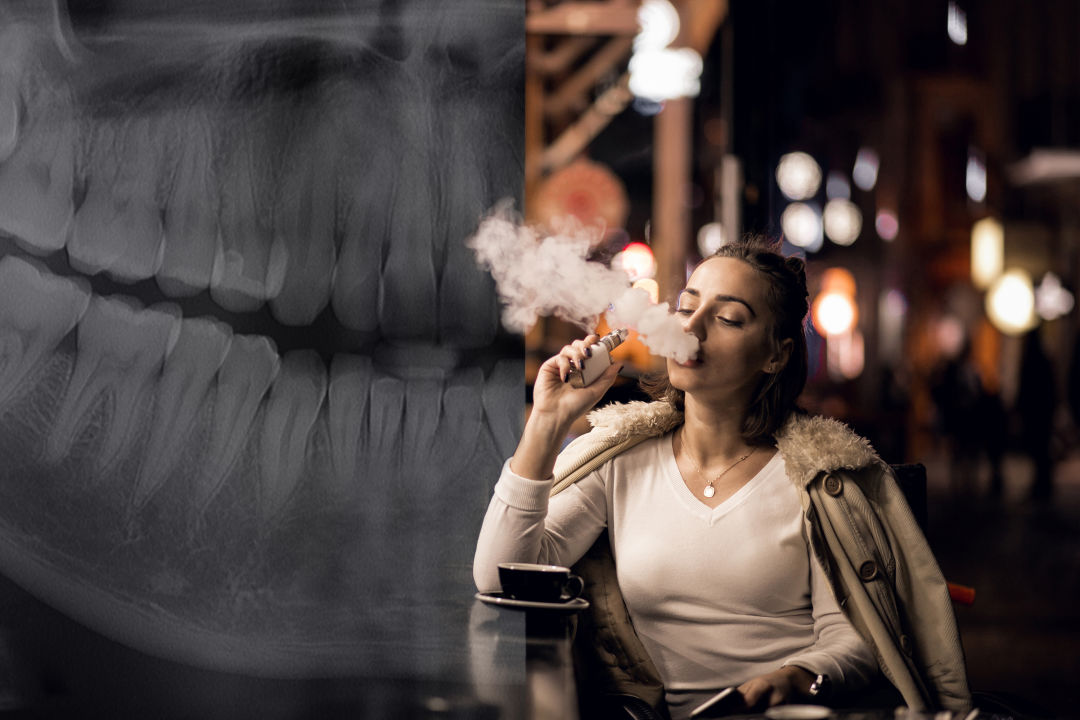Is Vaping Worse for Your Teeth Than Smoking?

Image: Kari Perrin/Shutterstock
You know the song about the old lady who swallowed a fly? It goes:
There was an old lady who swallowed a fly
I don’t know why she swallowed a fly—perhaps she’ll die!
In order to get rid of the fly, the woman swallowed a spider that “wriggled and jiggled and tickled inside her.” Then the woman swallowed a bird to get rid of the spider, a cat to get rid of the bird and on and on from there.
Modern technology can sometimes be like the old lady that swallowed a fly. It will sometimes provide us with solutions that only present us with new problems, particularly when it comes to our health.
Vaping is perfect example of this trap. For more than a decade, it has been presented as a healthier alternative to smoking. But just like with the old lady, new solutions come with new problems, particularly when it comes to your dental health.
“With vaping, there’s not as much heat as there is with smoke,” says Dr. Timothy Herring, a Sarasota area dentist, "so you don’t have the same kind of heat breakdown of a lot of harmful materials." But Herring cautions that the verdict is still out on vaping's long-term effects on dental health. “Vaping is so new that there’s very little data out there,” he says. “We’ve had a lot studies on the effects of cigarettes and cigarette smoke, but vaping is just in its infancy.”
So while available data shows that cigarette smoking is worse for your dental and overall health than vaping, it also suggests that people who are vaping now are part of a vast experiment and won’t know the consequences of their habits for years to come. But there are a handful of things that we do know that would lead one to believe that vaping is not necessarily a healthy alternative to smoking.
First of all, whether it’s smoked, vaped or chewed, nicotine restricts blood flow to the gums. This can lead to irreversible dental consequences, like the loss of the bone that anchors the teeth into the jaw. Vaping can also deliver far higher concentrations of nicotine than just regular old smoking.
Herring points to a handful of studies that show concerning results for those who vape. One of the studies notes that 43 percent of participants who vaped had gum disease and oral infections—double the amount compared to non-smokers.
Other studies reveal alarming effects of vaping on mouth bacteria. E-cigarettes are shown to stress bacterial communities and coat them with slime, causing inflammation. Vaping also dries out the mouth, and using sugar-flavored vapor causes the mouth to create acid, making for a combination that leaves teeth vulnerable to decay.
Herring cites a separate study on the negative side effects of inhaled aerosols published by the American Dental Association Science & Research Institute. The study shows that the heat setting on e-cigarettes can alter the physical and chemical properties of the vapor. The vapor can turn yellow and stain teeth, burn sensitive parts of the oral cavity and create a sticky coating that can remain on teeth and cause damage.
A 2018 National Academy of Sciences review of the science concluded that vaping poses fewer oral health risks than smoking, but this was based on limited data and is subject to change. The most concerning variable of vaping is how popular it is among young people. In a 2018 U.S. Food and Drug Administration study, the agency found that 20 percent of high school students reported using e-cigarettes. In 2011, it was just 1.5 percent. To make matters even more alarming, 5 percent of middle school students reported using e-cigarettes.
“[It's] like in the '40s, '50s and '60s, when they had advertisements and your family physician might be in the commercial saying, ‘Yeah, I smoke two packs of Marlboros a day, and look at me, I’m 75 years old!’" says Herring. "Nobody knew what was really going on.”



